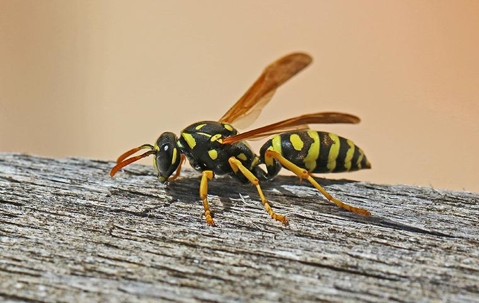The only thing worse than an uninvited guest crashing your backyard barbecue is a wasp joining in on the fun. And unfortunately, there are plenty of wasps in Tyler backyards. Find out why wasps enter your yard and what steps you can take to keep them out.
The Wasps Of Tyler
If you live in Tyler, you can expect to find one of several wasp species. By far the most aggressive Tyler wasp is the bald-faced hornet. This broad, black-bodied wasp has pale yellow markings on its face. Although people often confuse this wasp with a yellow jacket, it has a much more painful sting. The yellow jacket is also more slender and has more defined markings.
Paper wasps are more common than bald-faced hornets. With a pinched waist and legs that dangle, the paper wasp grows to be as large as one inch long. They build papery nests that resemble umbrellas. Meanwhile, mud daubers build tubular nests made with mud. Typically, their nests are under overhangs and eaves.
All of the wasps in Tyler tend to be protective of their nests. Even the most docile species of wasp will sting to defend its nest. And every wasp has venom that can result in a painful allergic reaction. At the very least, a sting will cause you pain.
What Brings Wasps To You
There’s plenty of food and shelter available to wasps in nature. So, why do wasps end up near manmade structures? Most homeowners attract wasps to their property without realizing it. All of the following factors could be bringing wasps to you:
Sweet Drinks And Foods
If you enjoy outdoor dining, your eating habits could be attracting wasps. Sweet drinks and sugary foods are a beacon to wasps and other insects. When you leave the foods and drinks out for an extended period, you could have a wasp problem.
Open Garbage Cans
There are plenty of food items in your garbage cans for wasps and their prey. Because many wasps eat insects, they often seek out garbage cans full of flies and other pests. Some wasps eat meat, which is usually plentiful in garbage cans.
Places To Hide
If you have harborages for wasps, they may find your property irresistible. Typically, wasps look to build nests in walls, crevices, cracks, and under overhangs. Properties with ideal nest locations will attract wasps.
Ripe Or Rotting Fruit
The sweetness of fruit attracts wasps and other insects. If you have fruit trees in your yard, those trees could be why you have a wasp problem. To reduce wasps, either remove the trees or pick fruit before it becomes too ripe. The next time you want to plant fruit trees, try to do it as far from your yard as possible.
Protecting Your Yard From Wasps
Now that you know what attracts wasps, you can take steps to keep them away. By taking away everything that wasps seek out, you make your yard unappealing to wasps.
There are a few simple precautions you can take to do this. For one, you can seal up all the cracks and crevices in your home. Keep vegetation to a minimum, and you may be able to prevent wasps from nesting in the vegetation. If you do have a garden, plant wasp-repelling greenery, like basil and wormwood.
One of the keys to wasp prevention is proper trash storage. Before you throw out your garbage, place it in a sealed bag. Then, make sure the lid of your garbage can closes completely. For the best results, work with a professional. Contact the Innovative Pest Control experts for more advice and assistance.
Categories:
- Wasp Prevention
The post Why Wasps Come Into Tyler Yards & How To Keep Them Out appeared first on Innovative Pest Control.

